How to take potato juice for pancreatitis and cholecystitis
Pancreatitis and cholecystitis are common diseases that can be both chronic and acute. Often these diseases occur, although in different organs, but at the same time, so they are treated together. For therapeutic purposes, not only medications are used, but also folk remedies, one of them is potato juice, which contains many useful components.
Chemical composition, microelements and characteristics of potato juice
Thanks to its vitamin and mineral complex, raw potatoes help fight various diseases, including inflammation of the gallbladder and pancreas. Potato juice has a minimum of contraindications and does not cause serious harm to the body.
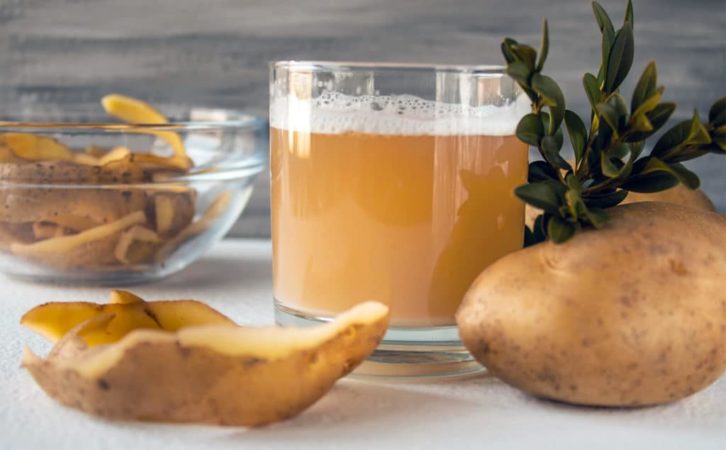
The vegetable contains vitamins A, C, D, E, H, K, PP and group B, as well as macro- and microelements with a mass useful properties:
- rubidium – normalizes the digestive process;
- nickel – responsible for regulating enzymatic reactions;
- aluminum – stimulates the regeneration of the skin, participates in the processes of bone tissue formation and digestion;
- lithium – strengthens the nervous system;
- vanadium – participates in carbohydrate metabolism;
- cobalt – normalizes the functioning of the digestive, circulatory and nervous systems;
- boron – stimulates cell growth;
- molybdenum – activates the body’s absorption of vitamin C;
- fluoride – helps strengthen bone tissue, as well as nails and hair;
- selenium – has an antioxidant effect;
- chromium – strengthens bones, normalizes blood pressure;
- copper – stimulates tissue formation, provides immune protection, normalizes digestion and hematopoiesis;
- sulfur – improves immunity;
- iodine – has a positive effect on the functioning of all organs of the body;
- zinc – promotes wound healing, improves skin condition;
- iron – regulates the level of hemoglobin in the blood and the process of oxygen absorption;
- chlorine – stimulates digestive and metabolic processes;
- phosphorus – promotes bone formation and metabolism;
- potassium – regulates the functioning of the kidneys and liver, strengthens the heart muscle;
- sodium – stimulates the metabolic process;
- magnesium – activates tissue formation;
- calcium – strengthens the nervous system and bone tissue.
Calorie content, BJU and nutritional value of potato juice
The energy value of 100 g of product is 77 kcal, it contains:
- proteins – 2 g;
- fats – 0.3 g;
- carbohydrates – 20 g.
What vitamins and beneficial properties are present in potato juice?
Potato juice enriched with proteins, fiber, organic acids. It also contains a small amount of fat.
For the whole body
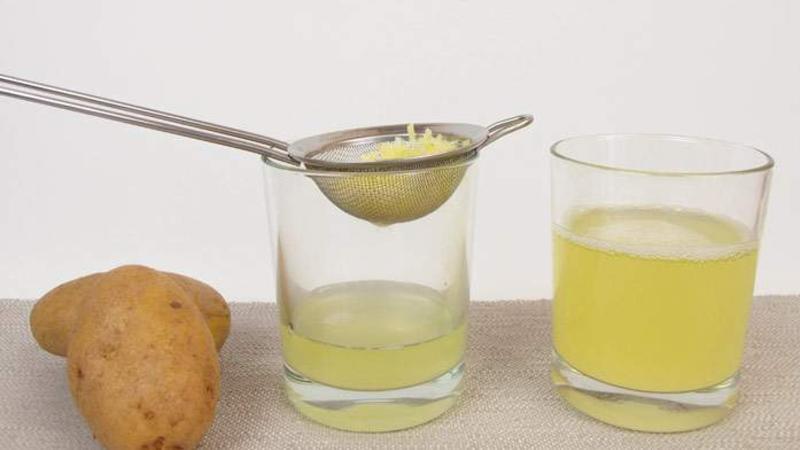
Consumption of potato juice helps normalize water-salt balance, metabolic processes and eliminate toxins from the body.
The product has the following properties:
- antiseptic;
- painkillers;
- cleansing;
- laxatives and diuretics;
- anti-inflammatory;
- general strengthening.
For the gastrointestinal tract
Potato juice stimulates peristalsis, improving intestinal function. In addition, the product maintains a normal level of stomach acidity, eliminates heartburn and prevents constipation.
How does potato juice affect the gastrointestinal tract and pancreas?
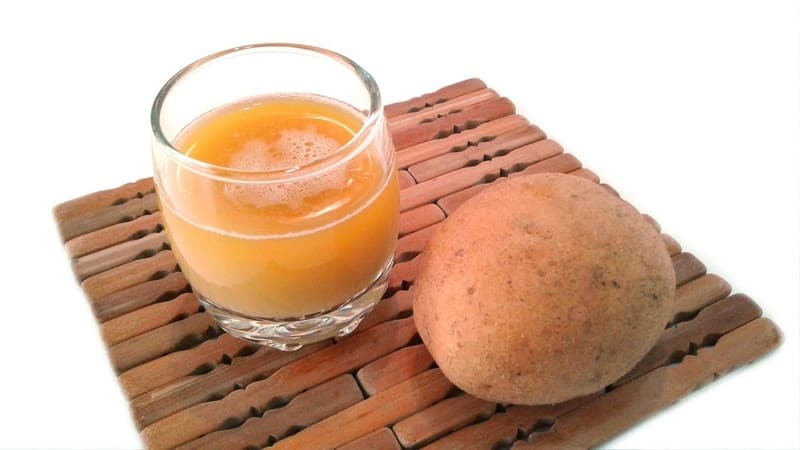
The juice of the tubers has a beneficial effect on the digestive organs, suppressing the active reproduction of enzymes and acid.
Important! It is unacceptable to consume stale juice, as well as juice obtained from green potatoes. In both cases, there is a high risk of poisoning by toxic substances.
In addition, the product has an analgesic effect for pancreatitis and cholecystitis, heals wounds for gastritis and ulcers with high acidity. The drink regulates blood glucose levels and removes excess fluid, which helps reduce swelling of the pancreas. It also relieves inflammation and envelops the pancreas, stopping the production of enzymes that have a negative effect on its mucosa and increase pain.
In case of pathology of the biliary system (pancreatitis, cholelithiasis, cholecystitis), the juice eliminates spasms and normalizes the outflow of secretions.
How to properly prepare and use as an aid in the treatment of pancreatitis and cholecystitis
To obtain the maximum effect, it is important to drink the drink immediately after preparation (within 5 minutes), preventing it from oxidizing upon contact with air. Potato juice is obtained using one of the following devices:
- coarse grater;
- juicer;
- meat grinder
The chopped vegetable is squeezed out using gauze.
How and when to take
When treating, it is important to follow the basic principles:
- drink the drink no later than 2 hours before meals;
- frequency of use – 2 times a day, 150 ml;
- do not add sugar and salt.
Important! The ideal time for a course of treatment is from August to November, at which time the vegetable has not yet had time to accumulate toxic substances.
During the course of therapy, fish and meat dishes are excluded from the diet and at the same time the consumption of fermented milk products is increased. The treatment regimen with potato juice is as follows: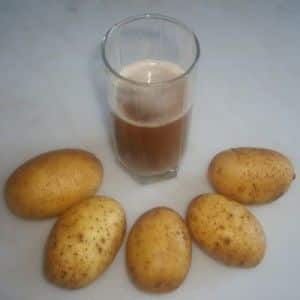
- for pancreatitis, gastritis, cholecystitis and heartburn – every morning 1 glass;
- for ulcers stomach – 3 times a day before meals, start with 1 tsp, gradually increasing the dosage, but not exceeding 1 glass;
- high blood pressure – 2 times a day, ½ cup.
There are several options for taking potato juice with a course duration of 3 weeks:
- 4 times a day, 50 ml;
- 2 times a day, 100 ml;
- ½ glass in the morning while simultaneously taking a warm decoction of herbs: rose hips, oregano, St. John's wort, mint, etc.;
- 100 ml with an interval of 2 hours.
Potato and carrot juice for pancreas
To enhance the effect, drinks: carrot and potato are mixed in equal proportions and taken before meals. Afterwards, take a horizontal position for 30 minutes.
Other
Potato juice goes well with kefir. In this case, first take the prepared juice, and after 5 minutes wash it down with kefir. Treatment with such a cocktail is permissible for no more than 2 weeks, after which a break of at least 10 days is required.
Important! The maximum permissible number of treatment courses with potato-carrot juice is 4.
Is juice therapy acceptable for complications?
Drinking juice in the acute phase of the disease is unacceptable, as it will cause diarrhea, accompanied by nausea and bloating.
Recommendations for proper intake of potato juice
When treating, it is important to adhere to several rules: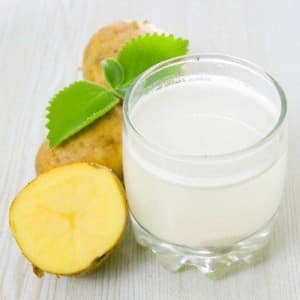
- do not take the juice later than 15 minutes after preparation, since the elements included in its composition during this time have time to oxidize and acquire harmful properties;
- For cooking, it is best to use young potato tubers;
- do not try to diversify the specific taste of the drink by adding various spices and herbs, otherwise serious harm will be caused to the gall bladder and pancreas;
- If during treatment you experience indigestion, it is worth reviewing your diet, temporarily excluding foods high in protein and carbohydrates.
Possible harm from potato juice and contraindications
Potatoes have virtually no contraindications, except for the following:
- overweight;
- individual intolerance.
In what cases should it not be used?
Treatment with the drink is unacceptable for patients suffering from diabetes, during exacerbation, as well as in the first stages of the recovery period.
Reviews from doctors
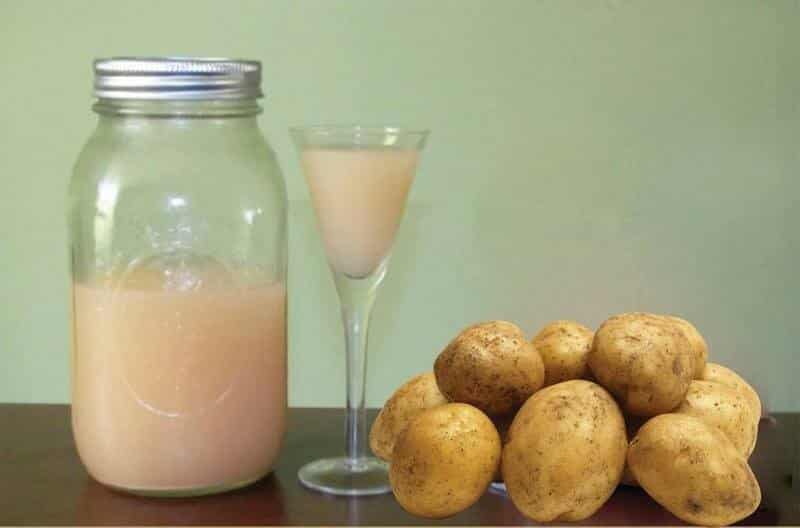
A survey conducted among specialists shows that drinking potato juice for cholecystitis and pancreatitis gives positive results and helps improve the condition of patients. The only condition is the combination of treatment with a folk remedy and the use of medications, as well as strict adherence to the juice intake regimen.
Veronika Ivanovna, 56 years old: “I have been periodically treating myself with potato juice for about 15 years now. It helps with exacerbation of gastritis and pancreatitis. The main thing in this matter is to consume the juice fresh, otherwise it will only cause harm.”
Vladimir, 28 years old: “There were many treatments for pancreatitis, but the best way to alleviate the condition was regular potato juice. The good thing about this tool is that it is always at hand.True, the potatoes must be natural and of high quality.”
Results
Relief of symptoms is observed within 4-5 days after the start of treatment. Patients who regularly drink potato juice have less severe exacerbations and a lower incidence of hospitalization.
Before using the product, we recommend that you consult with your doctor and rule out any contraindications.